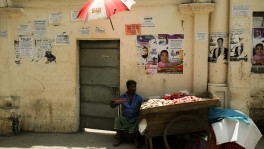From play to pay: How microtransactions took over gaming
From humble beginnings to a global monster, the impact microtransactions have had on the gaming industry has left an indelible mark
There is an old story about a frog in a pot of boiling water. If you were to put it in boiling water, the frog would panic and try to escape. But if you were to put it in cold water, and slowly turn up the heat, the frog would not notice the temperature until it was far too late, and it was already cooked.
On a quiet Monday in April of the year 2006, the world of gaming changed forever.
That day, Bethesda Studios, a game developer known most for its comprehensive first person RPG series, The Elder Scrolls, released what they coined a "microtransaction". That first microtransaction was the humble - and often mocked - addition of Horse Armour.
This was a purely cosmetic purchase for the mounts within the game and had no impact whatsoever on the gameplay.
This idea was meant to expand player experiences for a small fee, originally meant to supplement "expansion packs" – the method developers used prior to 2006 to continue their revenue stream without investing in a whole new game.
Many gamers at the time scoffed at the thought of paying $2.50 for something as minor as a cosmetic change. Most expansion packs at the time were released with hours of meaningful content in the $20 to $40 range, with full priced games being at most $60.
Despite this, the add-on was modestly successful, with many buying it either for the novelty or to support the game studio.
If only those gamers had internalised the age old adage "if you give them an inch, they'll take a mile" before it was too late.
Where consumers saw novelty, CEOs saw an untapped market.
The frog had been placed in a pot of water.
In the years that followed, more games began to switch from the expansion pack model to the microtransaction model, first with small things and slowly building up, forever pushing the boundaries of just how far gamers could be monetised.
Small things, weapons and character skins to "gacha" style games where for a small fee you would receive a random reward, with more desirable rewards being rarer and would require people to keep paying in order for the chance to win big. These "loot-box" mechanisms would become extremely popular among game publishers as a way to keep players spending money for the chance to get desirable in-game items.

In 2009, Electronic Arts (EA) - one of the largest game publishers still in existence - jumped on the bandwagon, reshaping the gaming landscape.
With the introduction of microtransactions into the FIFA ultimate team, a much loved game mode that allowed players to build their own football team, EA suddenly found an untapped market rich for exploitation.
And exploit it they did.
In 2009, the then CEO of EA John Riccitiello announced in a stockholder meeting, "When you are six hours into playing Battlefield and you run out of ammo in your clip and we ask you for a dollar to reload, you're really not that price sensitive at that point in time."
Such unfettered greed would only be rewarded in the years to come. While this idea was too extreme at the time, it cemented the direction the ship was sailing.
Leveraging the same deep seated human need that casinos do to make compulsive gamblers keep playing, EA used the desire for the world's most famous players to be part of a gamer's team, resulting in serious gameplay advantages, to extract hundreds, sometimes thousands of dollars from those at risk of compulsive gambling.
Throughout the 2010s in England alone, many stories of addiction to these game mechanics leading to financial ruin began to emerge. Incidents of working adults falling into addiction and spending their life savings to the point of becoming homeless began to emerge, but the truest danger was for the children.
All consoles allow users to input credit card information in order to ease purchases for games as well as microtransactions. Under normal circumstances this is fine, and the discretion of adults means that purchases come with a certain expectation that these decisions are made with forethought and self-control.
However, some games, such as FIFA, made the purchase of loot boxes too easy, often requiring a simple button press in the game itself with no confirmation of purchase required.

Thus young children, filled with dopamine from opening the flashily animated boxes and the desire to get their favourite player, would simply keep pressing the button that gives them what they want, not realising they are emptying their parents bank accounts.
To add insult to injury, game companies did not allow refunds at all, beyond those countries where they are legally obligated to do so.
In 2011, this feature alone had generated over $100 million for EA. By 2015, it touched $800 million per year. This year in 2023, EA has reported that microtransactions have reached the extraordinary peak of nearly $4.3 billion in revenue, with FIFA ultimate team being the source of almost half of that. This does not include direct revenue from sales of the game, which costs $70 for every yearly release.
And yet the numbers could and did go even higher.
In the case of mobile gaming on smartphones and tablets, total global revenues were reported at a staggering $92.2 billion in 2022, the first time in history the market declined, making a mere $1 billion less than 2021. This is an 83% increase in global microtransaction revenue from 2017, when the global market was a mere $50.4 billion.
The water is boiling.
While games like FIFA and Call of Duty are examples of how far large companies will go to monetise their customers, they are far from the most egregious, or predatory. That title goes to the plethora of mobile games available for free on the market that will shamelessly promote pay-to-win microtransactions to spur purchases among their player base.

Asia alone accounts for over 50% of global microtransaction revenue, with such things being particularly pervasive in south-east asia where "gacha", - a form of vending machine that can be used to get small collectible toys from a random pool - has been popular for decades.
This kind of mentality was easily ported to mobile games, and the term "gacha games" was established shortly after.
The key strategy of these sort of predatory microtransactions is hiding the true long term cost of these activities until the players become psychologically and financially committed and the sunk-cost fallacy has set in.
Over the years a war has formed between game publishers and regulators. As the number of stories and lawsuits over peoples lives being ruined from compulsive gambling habits these systems helped create rises, many governments, especially in Europe have begun to move.
Unfortunately due to the sheer financial power wielded by these companies in the form of lobbyists, it will inevitably be a long battle, where the lines are only shifted by truly egregious stories that move the public to act.
In truth microtransactions are here to stay; they are simply too profitable for the multitudes of companies that use them to fund their development cycles. But the ceiling of how predatory, insidious and costly they will be allowed to become is still yet to be defined.
While governments and companies will wage their high profile lawsuits, it will be the will of the people who vote with their wallets that will decide the future of gaming for good or for ill.
 Keep updated, follow The Business Standard's Google news channel
Keep updated, follow The Business Standard's Google news channel
















